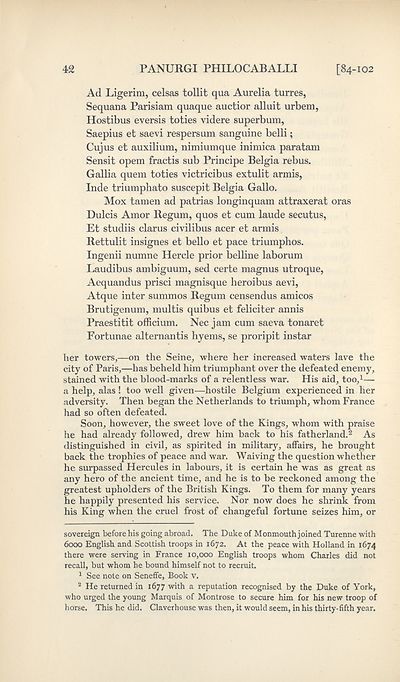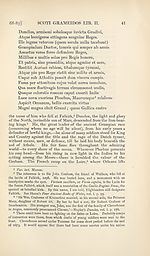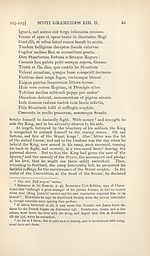Series 1 > Grameid: an heroic poem descriptive of the campaign of Viscount Dundee in 1689, and other pieces
(113) Page 42
Download files
Complete book:
Individual page:
Thumbnail gallery: Grid view | List view

42
PANURGI PHILOCABALLI
[84-102
Ad Ligerim, celsas tollit qua Aurelia turres,
Sequana Parisiam quaque auctior alluit urbem,
Hostibus eversis toties videre superbum,
Saepius et saevi respersum sanguine belli;
Cujus et auxilium, nimiumque inimica paratam
Sensit opem fractis sub Principe Belgia rebus.
Gallia quem toties victricibus extulit armis,
Inde triumphato suscepit Belgia Gallo.
Mox tamen ad patrias longinquam attraxerat oras
Dulcis Amor Regum, quos et cum laude secutus,
Et studiis clarus civilibus acer et armis
Rettulit insignes et bello et pace triumphos.
Ingenii numne Hercle prior belline laborum
Laudibus ambiguum, sed certe magnus utroque,
Aequandus prisci magnisque heroibus aevi,
Atque inter summos Regum censendus amicos
Brutigenum, multis quibus et feliciter annis
Praestitit officium. Nec jam cum saeva tonaret
Fortunae alternantis hyems, se proripit instar
her towers,—on the Seine, where her increased waters lave the
city of Paris,—has beheld him triumphant over the defeated enemy,
stained with the blood-marks of a relentless war. His aid, too,1—
a help, alas ! too well given—hostile Belgium experienced in her
adversity. Then began the Netherlands to triumph, whom France
had so often defeated.
Soon, however, the sweet love of the Kings, whom with praise
he had already followed, drew him back to his fatherland.2 As
distinguished in civil, as spirited in military, affairs, he brought
back the trophies of peace and war. Waiving the question whether
he surpassed Hercules in labours, it is certain he was as great as
any hero of the ancient time, and he is to be reckoned among the
greatest upholders of the British Kings. To them for many years
he happily presented his service. Nor now does he shrink from
his King when the cruel frost of changeful fortune seizes him, or
sovereign before his going abroad. The Duke of Monmouth joined Turenne with
6000 English and Scottish troops in 1672. At the peace with Holland in 1674
there were serving in France 10,000 English troops whom Charles did not
recall, but whom he bound himself not to recruit.
1 See note on Seneffe, Book v.
2 He returned in 1677 with a reputation recognised by the Duke of York,
who urged the young Marquis of Montrose to secure him for his new troop of
horse. This he did. Claverhouse was then, it would seem, in his thirty-fifth year.
PANURGI PHILOCABALLI
[84-102
Ad Ligerim, celsas tollit qua Aurelia turres,
Sequana Parisiam quaque auctior alluit urbem,
Hostibus eversis toties videre superbum,
Saepius et saevi respersum sanguine belli;
Cujus et auxilium, nimiumque inimica paratam
Sensit opem fractis sub Principe Belgia rebus.
Gallia quem toties victricibus extulit armis,
Inde triumphato suscepit Belgia Gallo.
Mox tamen ad patrias longinquam attraxerat oras
Dulcis Amor Regum, quos et cum laude secutus,
Et studiis clarus civilibus acer et armis
Rettulit insignes et bello et pace triumphos.
Ingenii numne Hercle prior belline laborum
Laudibus ambiguum, sed certe magnus utroque,
Aequandus prisci magnisque heroibus aevi,
Atque inter summos Regum censendus amicos
Brutigenum, multis quibus et feliciter annis
Praestitit officium. Nec jam cum saeva tonaret
Fortunae alternantis hyems, se proripit instar
her towers,—on the Seine, where her increased waters lave the
city of Paris,—has beheld him triumphant over the defeated enemy,
stained with the blood-marks of a relentless war. His aid, too,1—
a help, alas ! too well given—hostile Belgium experienced in her
adversity. Then began the Netherlands to triumph, whom France
had so often defeated.
Soon, however, the sweet love of the Kings, whom with praise
he had already followed, drew him back to his fatherland.2 As
distinguished in civil, as spirited in military, affairs, he brought
back the trophies of peace and war. Waiving the question whether
he surpassed Hercules in labours, it is certain he was as great as
any hero of the ancient time, and he is to be reckoned among the
greatest upholders of the British Kings. To them for many years
he happily presented his service. Nor now does he shrink from
his King when the cruel frost of changeful fortune seizes him, or
sovereign before his going abroad. The Duke of Monmouth joined Turenne with
6000 English and Scottish troops in 1672. At the peace with Holland in 1674
there were serving in France 10,000 English troops whom Charles did not
recall, but whom he bound himself not to recruit.
1 See note on Seneffe, Book v.
2 He returned in 1677 with a reputation recognised by the Duke of York,
who urged the young Marquis of Montrose to secure him for his new troop of
horse. This he did. Claverhouse was then, it would seem, in his thirty-fifth year.
Set display mode to:
![]() Universal Viewer |
Universal Viewer | ![]() Mirador |
Large image | Transcription
Mirador |
Large image | Transcription
Images and transcriptions on this page, including medium image downloads, may be used under the Creative Commons Attribution 4.0 International Licence unless otherwise stated. ![]()
| Scottish History Society volumes > Series 1 > Grameid: an heroic poem descriptive of the campaign of Viscount Dundee in 1689, and other pieces > (113) Page 42 |
|---|
| Permanent URL | https://digital.nls.uk/126596913 |
|---|
| Attribution and copyright: |
|
|---|
| Description | Over 180 volumes, published by the Scottish History Society, containing original sources on Scotland's history and people. With a wide range of subjects, the books collectively cover all periods from the 12th to 20th centuries, and reflect changing trends in Scottish history. Sources are accompanied by scholarly interpretation, references and bibliographies. Volumes are usually published annually, and more digitised volumes will be added as they become available. |
|---|


